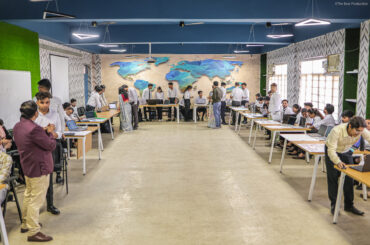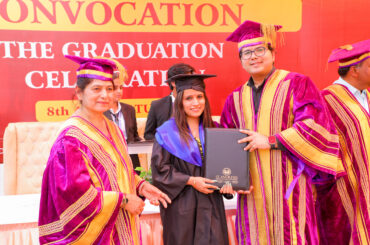Top Engineering Colleges in India
In India, engineering has great scope as India is home to some of the finest engineering colleges, including centrally funded technical institutes, which have earned global recognition for their academic excellence, cutting-edge research, and successful alumni.
These institutions are known for producing top-tier engineers who contribute to various sectors, including technology, infrastructure, research, and entrepreneurship.
The engineering education landscape in India is diverse, with prestigious government institutions like the IITs and NITs leading the way, along with top private universities that offer innovative programs and state-of-the-art facilities.
Some of the most opted courses in India and St. Andrews college or different Engineering college or Management colleges are as follows:-
- Btech
- Btech CSE
- MTech
- Btech ETCE
- BCA
- BBA
- MBA
- MCA
- DPharma – St. Andrews College of Pharmacy
- BPharma – St. Andrews College of Pharmacy
- BArch – St. Andrews College of Architecture
Indian Institutes of Technology (IITs)
Introduction: Established as premier institutions for higher education in engineering, the IITs are widely regarded as the best engineering colleges in India. They have a reputation for academic rigor, exceptional faculty, and outstanding research facilities.
Overview:
IITs are the gold standard in engineering education in India.
They offer a wide range of undergraduate, postgraduate, and doctoral programs.
IIT graduates are highly sought after by top companies globally, with many securing top positions in various industries.
St. Andrews Institute of Technology and Management (SAITM), Gurgaon
Introduction: SAITM is an emerging engineering college that has gained recognition for its industry-oriented curriculum and modern infrastructure, catering to the growing demand for skilled engineers in India.
Overview:
SAITM offers contemporary engineering programs designed to meet industry needs, with a focus on practical skills and hands-on learning.
The institute provides good placement opportunities, with strong connections to industry partners.
SAITM’s infrastructure supports an engaging learning environment, equipped with modern labs and facilities.
National Institutes of Technology (NITs)
Introduction: NITs are among the leading engineering institutions in India, established to provide high-quality technical education across the country. They play a crucial role in shaping the engineering talent pool in India.
Overview:
NITs offer a broad spectrum of engineering disciplines and are known for their strong academic framework.
They have a good placement record, with students being recruited by leading companies.
NITs also focus on research and innovation, contributing to the nation’s technological advancements.
Ambedkar National Institute of Technology (NIT) Jalandhar
Location: Jalandhar, Punjab
Overview
Academic Excellence: Known for its strong emphasis on research and quality education.
Facilities: Modern laboratories, research centers, and well-equipped classrooms.
Industry Connections: Strong ties with industry leading to good placement opportunities.
Campus Life: Vibrant campus with various student activities and organizations.
Delhi Technological University (DTU), Delhi
Introduction: Formerly known as Delhi College of Engineering (DCE), DTU is a premier engineering institution that combines traditional academic excellence with modern research and industry-oriented programs.
Overview:
DTU offers a comprehensive range of engineering disciplines with a strong emphasis on innovation and practical application.
The university maintains robust industry connections, which facilitate internships, placements, and collaborative projects.
DTU graduates are highly valued in the job market, often securing competitive positions in top companies.
Indian Institute of Information Technology (IIITs)
Introduction: IIITs specialize in information technology and engineering science, offering focused and cutting-edge programs in these fields. They have become prominent institutions in the domain of digital technologies.
Overview:
IIITs offer specialized programs in IT and related fields, with a curriculum designed to keep pace with industry developments.
They have strong ties with the tech industry, ensuring students are well-prepared for careers in software and IT sectors.
IIITs are also active in research, contributing to advancements in technology and computing.
The Institute of Advanced Technology, Pune, Maharashtra, is another notable institution known for its cutting-edge research and advanced technology programs. It offers a range of engineering disciplines and has strong industry connections.
Importance of Choosing the Right College for Engineering Courses

Selecting the right college is a crucial decision that can significantly impact your academic journey, career prospects, and personal development.
Here’s why choosing the right college is so important:
Quality of Education
Curriculum and Faculty: The quality of education you receive is largely determined by the curriculum and the faculty members. A good college will have a well-structured curriculum that keeps pace with industry standards and experienced faculty who are experts in their fields. This ensures that you gain in-depth knowledge and relevant skills that are critical in today’s competitive job market.
Research Opportunities: Top colleges often provide better research facilities and opportunities to work on innovative projects. Engaging in research can deepen your understanding of your field and open up opportunities for further studies or specialized career paths.
Career Opportunities
Placements: Colleges with strong placement cells and industry connections can significantly influence your early career. The right college will have a strong track record of placements with reputable companies offering competitive salary packages. Good placement support can help you transition smoothly from academic life to a professional career.
Internships and Industry Exposure: Best Engineering Colleges that have partnerships with industries offer better internship opportunities, which are crucial for gaining practical experience. This exposure not only enhances your resume but also helps you build a network within your industry, which can be invaluable for your career.
Personal and Professional Growth
Peer Learning and Networking: The college environment plays a critical role in your personal growth. A college with a diverse and motivated student body encourages peer learning, where you can share ideas, collaborate on projects, and form lasting relationships. Networking opportunities provided by alumni networks and industry interactions can also be pivotal in your career.
Extracurricular Activities: Participating in clubs, sports, and other extracurricular activities offered by the college helps in developing leadership skills, teamwork, and time management. These soft skills are as important as technical knowledge in building a successful career.
Infrastructure and Resources
Facilities: The availability of state-of-the-art labs, libraries, and other facilities can greatly enhance your learning experience. The right college will have modern infrastructure that supports both academic and extracurricular activities, providing a holistic educational environment.
Support Services: Top Engineering Colleges in India with strong student support services, such as counseling, academic advising, and career guidance, help you navigate challenges during your academic journey and ensure that you stay on track to achieve your goals.
Reputation and Brand Value
Institutional Reputation: The reputation of the college can have a lasting impact on your career. Graduating from a well-known and respected institution can open doors to better job opportunities, higher salaries, and a stronger professional network.
Alumni Success: The achievements of a college’s alumni can be a good indicator of the institution’s quality. Top Engineering Colleges in India with successful alumni who have made significant contributions in their fields often have a strong brand value, which can be beneficial when seeking jobs or applying for higher studies.
Long-Term Return on Investment (ROI)
Financial Considerations: While top engineering colleges in India might have higher tuition fees, the long-term ROI, in terms of better job placements, higher salaries, and career growth, often justifies the investment. It’s important to consider how the college you choose will impact your financial future.
Scholarships and Financial Aid: The right college will offer scholarships, grants, and financial aid options to help manage the cost of education. This support can make a significant difference, particularly if finances are a concern.
Fees Structure of Top Engineering Colleges in India

Here’s the fee structure for government and private engineering colleges in India:
Government Engineering Colleges in India
Central Government Institutions
- Tuition Fees: Typically range from ₹1,00,000 to ₹2,00,000 per year.
- Additional Costs: Hostel, mess, and other amenities can add an extra ₹20,000 to ₹50,000 annually.
State Government Institutions
- Tuition Fees: Usually between ₹50,000 and ₹1,00,000 per year.
- Additional Costs: Hostel and other charges typically range from ₹10,000 to ₹30,000.
Private Engineering Colleges in India
Top Private Institutions
- Tuition Fees: Typically between ₹2,00,000 and ₹4,00,000 per year.
- Additional Costs: Hostel and other fees generally range from ₹50,000 to ₹1,50,000.
- Top Private Institutions:
- Birla Institute of Technology and Science, Pilani
- Vellore Institute of Technology, Vellore
- St. Andrews Institute of technology and management (SAITM), Gurgaon- Fees between ₹78,500 to ₹98,500.
- Institute of Chemical Technology, Mumbai, Maharashtra: Known for its specialized programs in chemical engineering and technology, with tuition fees typically between ₹2,00,000 and ₹4,00,000 per year.
Other Private Engineering Colleges in India
- Tuition Fees: Typically fall between ₹1,00,000 and ₹3,00,000 per year.
- Additional Costs: Hostel and other charges can vary from ₹30,000 to ₹1,00,000.
Deemed-to-Be Universities
- Tuition Fees: Generally range from ₹1,50,000 to ₹3,00,000 per year.
- Additional Costs: Hostel and related fees typically range from ₹30,000 to ₹1,00,000.
Entrance Exams Accepted by Top Engineering Colleges in India
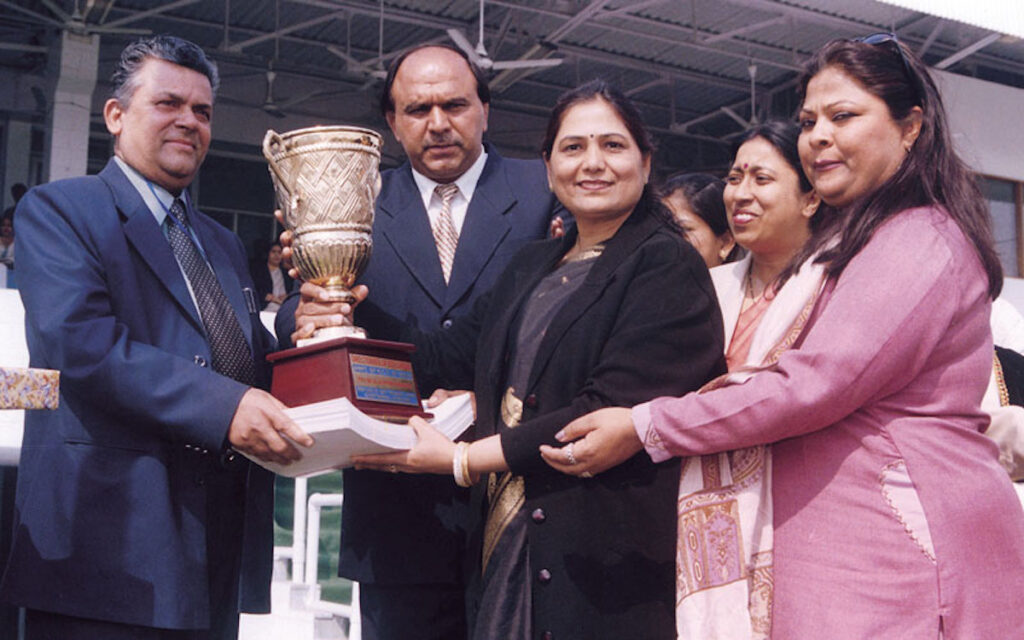
Entrance exams play a critical role in gaining admission to top engineering colleges in India.
Here’s an overview of the major entrance exams for engineering aspirants:
Joint Entrance Examination (JEE) Main
Conducted By: National Testing Agency (NTA)
Purpose: Admission to undergraduate engineering programs (B.E./B.Tech) in NITs, IIITs, and other centrally funded technical institutions, as well as serving as a qualifying exam for JEE Advanced. Institutions like Vellore Institute of Technology, Vellore, Tamil Nadu, also accept JEE Main scores for admission to their engineering programs.
Exam Pattern: Multiple-choice and numerical questions covering Physics, Chemistry, and Mathematics.
Frequency: Conducted twice a year (January and April).
Eligibility: Candidates who have completed or are appearing in their 12th-grade exams with Physics, Chemistry, and Mathematics.
Joint Entrance Examination (JEE) Advanced
Conducted By: One of the IITs on a rotational basis.
Purpose: Admission to undergraduate programs in the IITs.
Exam Pattern: Multiple-choice, numerical, and match-the-following questions in Physics, Chemistry, and Mathematics.
Eligibility: Candidates who qualify JEE Main and rank among the top 2,50,000 candidates.
Frequency: Conducted once a year.
Birla Institute of Technology and Science Admission Test (BITSAT)
Conducted By: BITS Pilani
Purpose: Admission to integrated first-degree programs at BITS Pilani campuses (Pilani, Goa, Hyderabad).
Exam Pattern: Objective questions covering Physics, Chemistry, Mathematics/Biology, English, and Logical Reasoning.
Frequency: Conducted once a year.
Eligibility: Candidates must have passed 12th-grade exams with Physics, Chemistry, and Mathematics, securing a minimum of 75% in aggregate.
State-Level Engineering Entrance Exams
Maharashtra Common Entrance Test (MHT CET): For admission to engineering colleges in Maharashtra.
West Bengal Joint Entrance Examination (WBJEE): For admission to engineering colleges in West Bengal.
Karnataka Common Entrance Test (KCET): For admission to engineering colleges in Karnataka.
Tamil Nadu Engineering Admissions (TNEA): For admission to engineering colleges in Tamil Nadu (based on 12th-grade marks).
COMEDK UGET
Conducted By: Consortium of Medical, Engineering and Dental Colleges of Karnataka (COMEDK)
Purpose: Admission to undergraduate engineering programs in top engineering colleges in India in Karnataka.
Exam Pattern: Multiple-choice questions in Physics, Chemistry, and Mathematics.
Frequency: Conducted once a year.
Eligibility: Candidates must have completed or be appearing in their 12th-grade exams with Physics, Chemistry, and Mathematics.
Eligibility Criteria for Engineering Courses
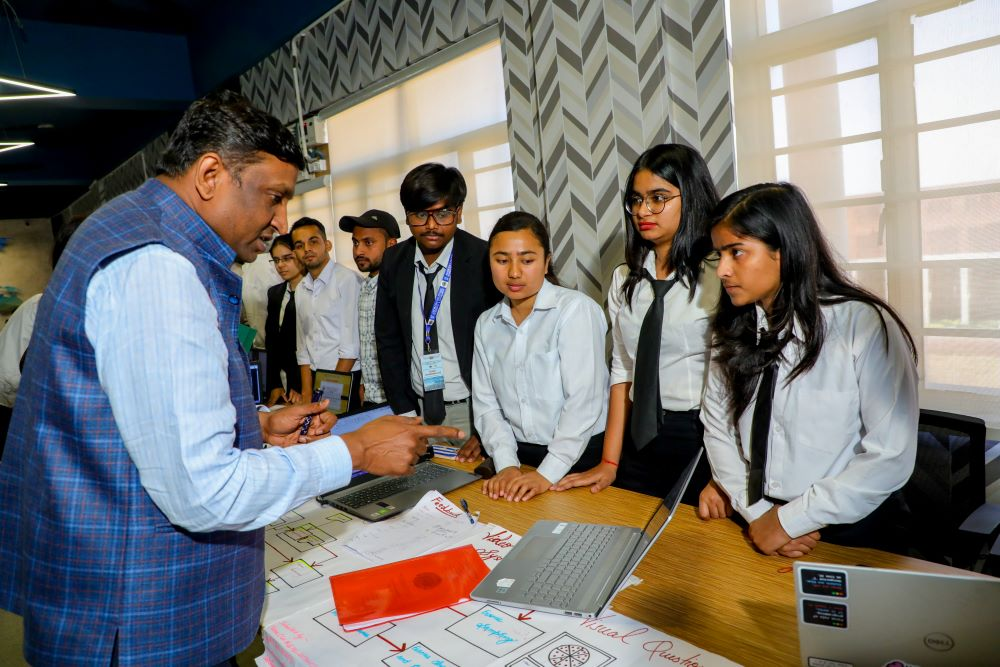
The eligibility criteria for engineering courses in India generally involve educational qualifications, age limits, and sometimes entrance exams.
Here’s a detailed overview:
General Eligibility Criteria
Educational Qualifications
10+2 or Equivalent: Candidates must have completed their 10+2 education or equivalent with a focus on Science subjects.
Subjects Required: Physics, Chemistry, and Mathematics (PCM) are typically required for B.Tech and B.E. programs. Some programs may also accept students with a background in Biology or Computer Science.
Minimum Marks: Most institutions require a minimum aggregate percentage in 10+2. Generally, it is around 50% to 60% aggregate in PCM. This percentage may vary based on the institution and category (e.g., reserved categories may have lower percentage requirements).
Age Limit
Typical Age Limit: There is generally no strict upper age limit for admission. However, candidates usually need to be below 21-22 years of age at the time of admission, depending on the specific entrance exam or institution’s criteria.
Entrance Exam Requirements
Joint Entrance Examination (JEE) Main
Eligibility: Candidates should have passed or be appearing in their 12th grade with PCM.
Age Limit: Generally, candidates should be born on or after October 1, 1999 (for general category). Relaxations may apply for reserved categories.
Joint Entrance Examination (JEE) Advanced
Eligibility: Only candidates who qualify JEE Main and are among the top 2,50,000 rank holders are eligible.
Age Limit: Same as JEE Main; typically, candidates should be born on or after October 1, 1999.
Birla Institute of Technology and Science Admission Test (BITSAT)
Eligibility: Candidates should have passed or be appearing in their 12th grade with PCM. A minimum aggregate of 75% in PCM is often required.
Age Limit: No specific age limit is mentioned.
State-Level Entrance Exams
Eligibility: Generally similar to the national exams; candidates should have completed or be appearing in their 12th grade with PCM.
Age Limit: Varies by state; generally, there is no strict age limit.
Special Categories
Reserved Categories
Relaxations: Certain reservations and relaxations in educational qualifications and age limits are provided for SC/ST/OBC/PwD candidates as per government regulations.
International Students
Eligibility: Criteria may vary based on the institution. Generally, international students need to meet similar educational qualifications and provide proof of equivalency of their 10+2 education.
Additional Considerations
Diploma Holders: Candidates with a diploma in engineering may have different eligibility criteria for lateral entry into the second year of B.Tech programs.
Foreign Qualifications: Candidates with international qualifications must have their credentials evaluated and recognized by the relevant authorities or institutions.
Location Wise Top Engineering Colleges in India
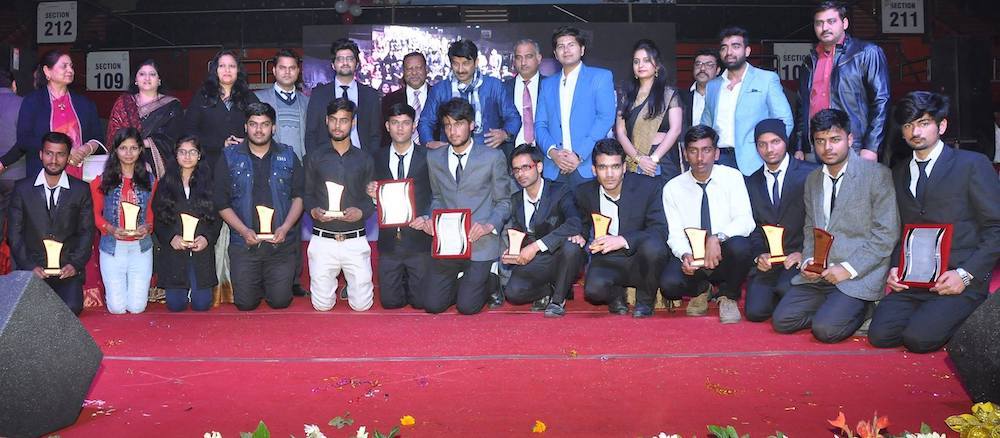
Here’s a location-wise list of some of the top engineering colleges in India:
North India
Delhi/NCR
- Indian Institute of Technology (IIT) Delhi
- Overview: One of the premier IITs known for its rigorous academic programs and research.
- Key Highlights: Consistently ranked among the top engineering institutions globally.
- St. Andrews Institute of Technology and Management (SAITM)
- Overview: A well-regarded private engineering institution offering a range of engineering programs.
- Key Highlights: Known for its modern infrastructure and industry-oriented curriculum.
- Delhi Technological University (DTU)
- Overview: Known for its excellent engineering programs and strong industry connections.
- Key Highlights: Strong placement records and research opportunities.
- Netaji Subhas University of Technology (NSUT)
- Overview: Renowned for high-quality technical education and research.
- Key Highlights: Modern infrastructure and industry-oriented programs.
Punjab
- Punjab Engineering College (PEC) Chandigarh
- Overview: Offers a range of engineering programs with a focus on quality education.
- Key Highlights: Good placement records and a strong reputation in research.
Uttar Pradesh
- Indian Institute of Technology (IIT) Kanpur
- Overview: A premier IIT with a reputation for excellence in engineering education and research.
- Key Highlights: Offers a range of engineering disciplines and has a strong industry presence.
West India
Maharashtra
- Indian Institute of Technology (IIT) Bombay
- Overview: One of the top IITs, recognized globally for its research, innovation, and academic excellence.
- Key Highlights: Offers a wide range of engineering disciplines and has a strong industry interface.
- Veermata Jijabai Technological Institute (VJTI), Mumbai
- Overview: A prominent engineering college with a long history of excellence.
- Key Highlights: Strong alumni network and good placement opportunities.
Gujarat
- Institute of Technology, Nirma University, Ahmedabad
- Overview: Known for its quality education and industry connections.
- Key Highlights: Offers various engineering programs with good placement records.
Rajasthan
- Malaviya National Institute of Technology (MNIT) Jaipur
- Overview: A leading NIT known for its high-quality technical education and research.
- Key Highlights: Strong industry connections and research opportunities.
South India
Karnataka
- Indian Institute of Science (IISc), Bengaluru
- Overview: Known for its focus on advanced research and engineering education.
- Key Highlights: One of the top institutions for research in engineering, science.
- R.V. College of Engineering (RVCE), Bengaluru
- Overview: A well-regarded private engineering college with a strong emphasis on research and industry collaboration.
- Key Highlights: Good placement records and a wide range of engineering courses.
Tamil Nadu
- Indian Institute of Technology (IIT) Madras
- Overview: A leading IIT known for its academic excellence and research in engineering and technology.
- Key Highlights: Consistently ranked among the top engineering institutes globally.
- Anna University, Chennai
- Overview: Offers a range of engineering programs with a focus on research and industry connections.
- Key Highlights: Known for its research initiatives and strong industry connections.
Andhra Pradesh
- Indian Institute of Technology (IIT) Hyderabad
- Overview: One of the newer IITs with a focus on cutting-edge research and innovation.
- Key Highlights: Offers state-of-the-art facilities and a strong emphasis on interdisciplinary research.
East India
West Bengal
- Jadavpur University, Kolkata
- Overview: A renowned university with a strong engineering faculty and research programs.
- Key Highlights: Offers a range of engineering disciplines and has a solid reputation in research.
- Indian Statistical Institute (ISI), Kolkata
- Overview: Specializes in statistics and applied mathematics, with strong engineering and computational research programs.
- Key Highlights: Offers specialized programs with a focus on research and development.
Odisha
- National Institute of Technology (NIT) Rourkela
- Overview: Known for its strong academic programs and research.
- Key Highlights: Offers a range of engineering disciplines with good placement records.
Central India
Madhya Pradesh
- Maulana Azad National Institute of Technology (MANIT), Bhopal
- Overview: A leading NIT with a focus on high-quality engineering education and research.
- Key Highlights: Strong industry connections and research opportunities.
Chhattisgarh
- National Institute of Technology (NIT) Raipur
- Overview: Known for its strong academic programs and research initiatives.
- Key Highlights: Offers a range of engineering disciplines and has good placement records.
Best Private Engineering Colleges
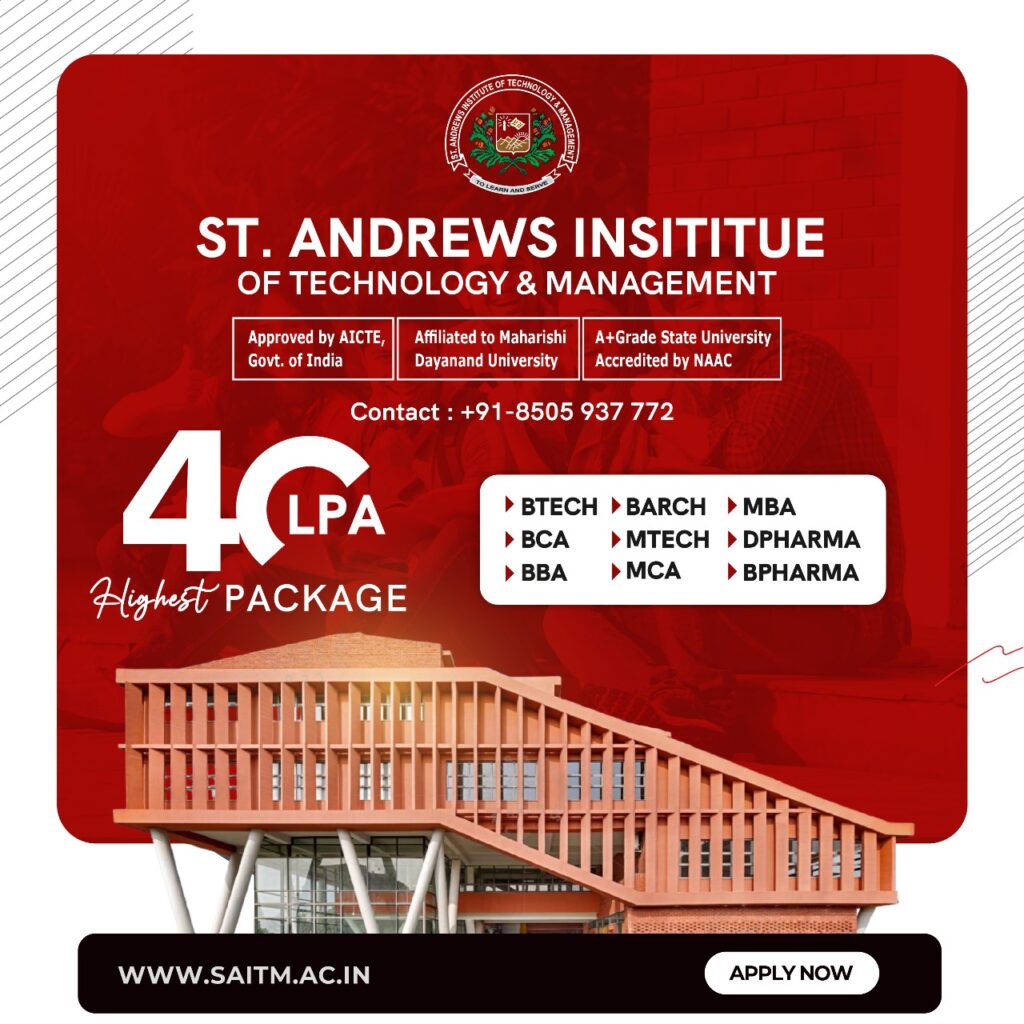
Here are some of the top private engineering colleges in India:
Shiv Nadar University (SNU)
Location: Greater Noida, Uttar Pradesh
Overview: Renowned for its research-driven approach and interdisciplinary programs.
Key Highlights: Strong emphasis on innovation, excellent faculty, and state-of-the-art infrastructure.
St. Andrews Institute of Technology and Management (SAITM)
Location: Gurgaon
Overview: A well-regarded private engineering institution offering a range of engineering programs.
Key Highlights: Known for its modern infrastructure and industry-oriented curriculum.
Sri Sivasubramaniya Nadar College of Engineering (SSN)
Location: Chennai, Tamil Nadu
Overview: Offers high-quality education with a focus on research and development.
Key Highlights: Well-equipped labs, experienced faculty, and excellent placement record.
National Institute of Science and Technology (NIST), Bhubaneswar
Location: Bhubaneswar, Odisha
Overview: Industrial Technology, Bhubaneswar is a well-regarded private engineering institution known for its emphasis on technical education and research. It offers undergraduate, postgraduate, and doctoral programs across various engineering and technology disciplines.
BMS College of Engineering
Location: Bengaluru, Karnataka
Overview: Known for its strong academic curriculum and industry connections.
Key Highlights: Good infrastructure, diverse programs, and active placement cell.
JSS Academy of Technical Education
Location: Bengaluru, Karnataka
Overview: Offers a range of engineering programs with a strong emphasis on practical skills.
Key Highlights: Experienced faculty, modern facilities, and good placement opportunities.
Sathyabama Institute of Science and Technology
Location: Chennai, Tamil Nadu
Overview: Renowned for its engineering and technological research.
Key Highlights: Strong industry links, research facilities, and vibrant campus life.
Birla Institute of Technology and Science (BITS) – Pilani
Location: Pilani, Rajasthan
Overview: One of the leading private engineering institutions in India with a strong academic reputation.
Key Highlights: Excellent faculty, innovative research, and a high placement rate.
Top Government Engineering Colleges
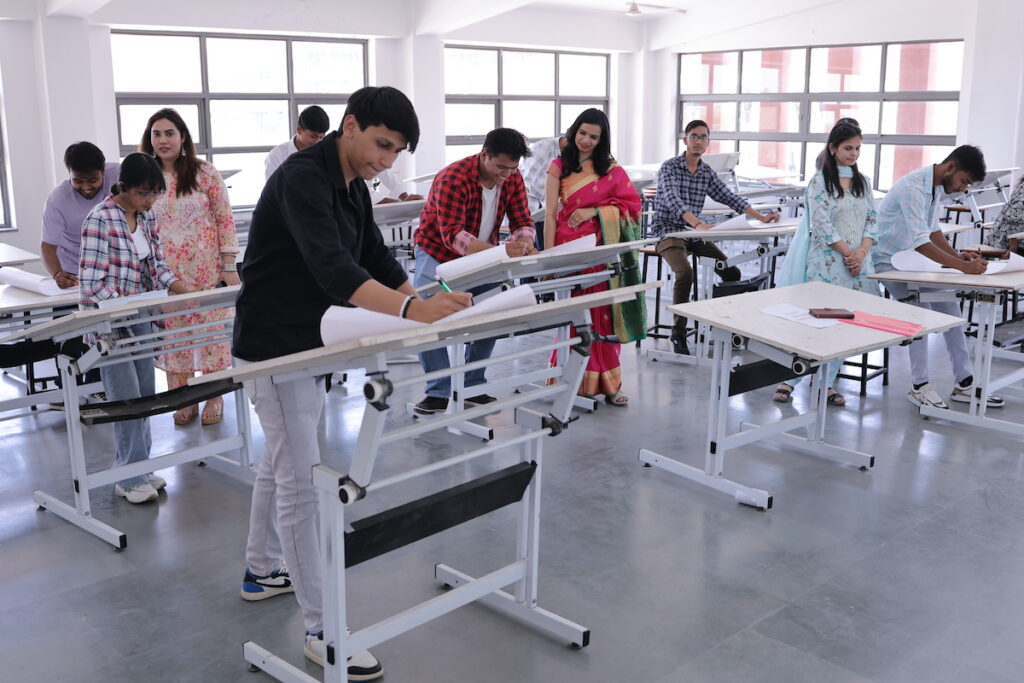
Here are some of the best government engineering colleges in India:
Indian Institutes of Technology (IITs)
Location: Mumbai, Delhi, Kanpur, Madras
Overview: Consistently ranked among the top engineering institutions globally, known for its research and innovation.
Key Highlights: World-class faculty, cutting-edge research, and extensive industry connections.
National Institutes of Technology (NITs)
Location: Tiruchirappalli, Warangal
Overview: One of the top engineering colleges in India, known for its strong academic programs and placements.
Key Highlights: Excellent infrastructure, experienced faculty, and a vibrant campus life.
Institute of Chemical Technology (ICT) Mumbai
Location: Mumbai, Maharashtra
Overview: Specializes in chemical engineering and technology with a strong research focus.
Key Highlights: Leading research output, industry partnerships, and a strong academic record.
Delhi Technological University (DTU)
Location: New Delhi
Overview: Known for its engineering and technology programs with a focus on innovation and research.
Key Highlights: Comprehensive curriculum, strong placement cell, and modern infrastructure.
FAQs
What are the top engineering colleges in India?
Some of the top engineering colleges include the Indian Institutes of Technology (IITs) in Bombay, Delhi, Kanpur, Madras, and Kharagpur, National Institutes of Technology (NITs) such as Trichy and Warangal, and other prominent institutions like Delhi Technological University (DTU) and the Institute of Chemical Technology, Mumbai, Maharashtra, Institute of Advanced Technology, Pune, Maharashtra, Vellore Institute of Technology, Vellore, Tamil Nadu.
How can I get admission to these top engineering colleges?
Admissions to most top engineering colleges in India are through national-level entrance exams such as the Joint Entrance Examination (JEE) Main and JEE Advanced for IITs and NITs. Some institutions also have their own entrance tests or criteria.
What is the eligibility criteria for admission?
Typically, candidates must have completed their higher secondary education (10+2) with Physics, Chemistry, and Mathematics as core subjects. Specific eligibility requirements may vary by institution.
What are the fees for engineering programs at top colleges?
Fees vary widely among institutions. Government colleges generally have lower fees compared to private ones. For example, IITs and NITs have relatively modest fees, while private institutions may charge higher fees.
What are the placement opportunities like?
Top engineering colleges generally have strong placement records, with many students securing positions in leading multinational companies. They often have dedicated placement cells that help students with job placements and internships.
How important is the college’s ranking in choosing an engineering program?
While rankings can be an indicator of a college’s reputation, it is important to consider factors such as faculty, infrastructure, industry connections, and personal career goals when choosing a college.
Are there scholarships available for engineering students?
Yes, many top engineering colleges offer scholarships based on merit, need, or both. Additionally, there are government and private scholarships available to support students financially.
What specializations are available in engineering programs?
Top engineering colleges offer a wide range of specializations including Computer Science Engineering, Mechanical Engineering, Civil Engineering, Electrical Engineering, Chemical Engineering, Aerospace Engineering and newer fields such as Artificial Intelligence, Data Science, and Biotechnology.
Can I pursue higher studies after completing my engineering degree?
Yes, many engineering graduates go on to pursue higher studies such as a Master’s (M.Tech, M.S.) or a Doctorate (Ph.D.) in their field of interest. Some may also choose to pursue management studies (MBA) or other professional courses.
What are centrally funded technical institutes?
Centrally Funded Technical Institutes (CFTIs) are a group of technical institutions in India funded by the central government. These institutes are established to provide high-quality technical education and research opportunities across various engineering and technology disciplines.
How do I choose the best engineering college for me?
Consider factors such as the college’s accreditation, faculty expertise, infrastructure, research opportunities, placement record, and personal interests. Visiting campuses and talking to current students can also help in making an informed decision.


